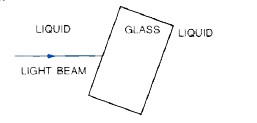State whether light slows down or speeds up in the following cases :
Light going from glass to water.
To determine whether light slows down or speeds up when it travels from glass to water, we can follow these steps:
1. Understand the Concept of Refractive Index:
- The refractive index (μ) of a medium is defined as the ratio of the speed of light in a vacuum (C) to the speed of light in that medium (V). This can be expressed as:
μ=CV
- Here, C is a constant (approximately 3×108 m/s).
2. Identify the Refractive Indices:
- The refractive index of glass (μ_glass) is approximately 1.5.
- The refractive index of water (μ_water) is approximately 43 or 1.33.
3. Compare the Refractive Indices:
- Since the refractive index of glass (1.5) is greater than that of water (1.33), we can conclude that glass is a denser medium compared to water.
4. Determine the Change in Speed:
- When light travels from a denser medium (glass) to a rarer medium (water), the refractive index decreases. According to the relationship between refractive index and speed:
- If μ decreases, the speed of light (V) increases.
- Therefore, as light moves from glass to water, its speed increases.
5. Conclusion:
- Light speeds up when it travels from glass to water.
Final Answer:
Light speeds up (increases in speed) when going from glass to water.
---
- The refractive index (μ) of a medium is defined as the ratio of the speed of light in a vacuum (C) to the speed of light in that medium (V). This can be expressed as:
μ=CV
- Here, C is a constant (approximately 3×108 m/s).
- The refractive index of glass (μ_glass) is approximately 1.5.
- The refractive index of water (μ_water) is approximately 43 or 1.33.
- Since the refractive index of glass (1.5) is greater than that of water (1.33), we can conclude that glass is a denser medium compared to water.
- When light travels from a denser medium (glass) to a rarer medium (water), the refractive index decreases. According to the relationship between refractive index and speed:
- If μ decreases, the speed of light (V) increases.
- Therefore, as light moves from glass to water, its speed increases.
- Light speeds up when it travels from glass to water.
Light speeds up (increases in speed) when going from glass to water.
Topper's Solved these Questions
- LIGHT ENERGYBOOK - ICSECHAPTER - LIGHT ENERGYEXERCISE - QUESTIONS
6 Videos
- LIGHT ENERGYBOOK - ICSECHAPTER - LIGHT ENERGYEXERCISE - QUESTIONS (Write T for True and F for False)
5 Videos
- LIGHT ENERGYBOOK - ICSECHAPTER - LIGHT ENERGYEXERCISE - TEST YOURSELF (SELECT THE CORRECT)
10 Videos
- HEATBOOK - ICSECHAPTER - HEATEXERCISE - EXERCISE (PICTURE)
10 Videos
- MODEL TEST PAPER 1BOOK - ICSECHAPTER - MODEL TEST PAPER 1EXERCISE - SECTION II
43 Videos
Similar Questions
State whether light slows down or speeds up in the following cases :
Light going from air to glass.
View SolutionState whether light slows down or speeds up in the following cases :
Light going from water to air.
View SolutionState the speed of light
View SolutionWhat is the shape of the wavefront in each of the following cases ?
Light diverging from a point source.
View SolutionState the speed of light in glass
View SolutionA ray of light travelling obliquely from glass to air :
View SolutionCritical angle of light passing from glass to air is least for
View SolutionThe diagram below shows a glass block suspended in a liquid. A beam of light of single colour is incident from liquid on one side of the block.

(a) Draw diagrams to show how does the light bend when it travels from liquid to glass and then to liquid if (i) the light slows down in glass, and (ii) the light speeds up in glass.
(b) State two conditions under which the light ray passing from liquid to glass travels straight without bending. will the glass be visible then ?
View SolutionWhich of the following travels with the speed of light ?
View SolutionA: The speed of light in water is not same as that in flowing water.
R: The speed of light in water is not independent of the relative motion between the observer and the medium.
View Solution
